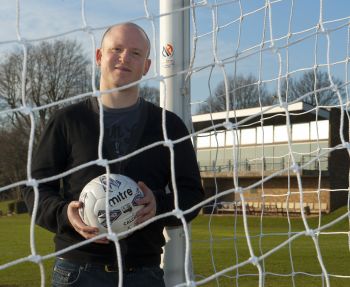Crowd research shows why we love the terraces and hate the Tube
By: Alison Field
Last updated: Friday, 28 January 2011

David Novelli
David Novelli's change of career from chef to psychologist was in part inspired by his love of football - and has led to some interesting discoveries of how people behave in crowds.
Research student David, aged 33, decided to go back into education after eight years as a chef. Intrigued by experiences shared with fellow Tottenham Hotspur supporters on the terraces, he decided to study psychology and developed a particular interest in crowd behaviour.
As David had left school with just a handful of GCSEs, he enrolled on an Access to Higher Education course at his local college, then applied to study social psychology at Sussex. He completed an undergraduate degree in 2005 and went on to win the Psychology department prize for the year's best dissertation.
David, the first member of his family to go to university, went on to study for a doctorate supervised by leading crowd-behaviour academic Dr John Drury. He will receive his doctorate at the winter graduation ceremonies today (Friday 28 January).
David's doctoral thesis - published in a leading psychology journal and nominated for a British Psychological Society award - throws light on why people behave in different ways depending on which crowd they are a part of.
David noticed that, while in many everyday situations (such as travelling by Tube to work) we dislike being close up to others, in certain other situations (including football matches and music events) we actually seek out such closeness.
This observation allowed David to question the beliefs that people always seek to avoid being crowded in and that we each have a fixed level of 'personal space' that we strive to maintain.
David tested this idea of 'personal space' by creating a series of experiments in which unwitting subjects were asked to take part in bogus social situations. He found that people sought out closer physical contact with others when they were seemingly from the same, as opposed to a different, social group.
He argued that people can have several different and even contradictory identities, based on their association with different groups. David's conclusion is that 'personal space' is not fixed, but is highly variable, depending not on the density of the crowd, but on 'who' each member of the crowd is at the time.
David says: "My research could be used to develop crowd-management strategies by demonstrating the conditions under which people will find sharing a space with other people to be pleasant and enjoyable, or just plain repulsive! This would be particularly important in the design of public spaces, such as sports stadia."
David now works at Sussex as a Research Fellow on a Leverhulme Trust-funded research project with Dr Drury on crowds in mass emergencies.

